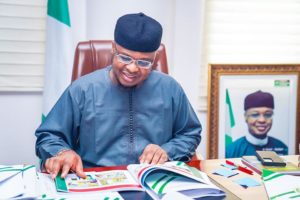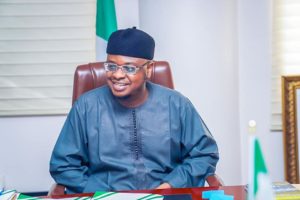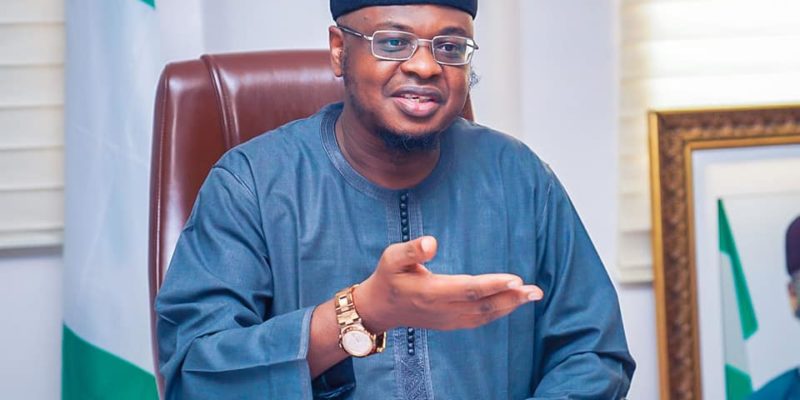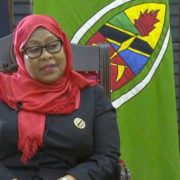Nigeria’s Minister of Communications and Digital Economy, Prof Isa Ali Ibrahim (Pantami), PhD is deemed by many to be disruptive. The professor of Cybersecurity does not deny this depiction. Not one to be so conventional, the scholar, cleric and technocrat has been able to rework ministerial tasks in a way that has marveled his subordinates, industry stakeholders and critics. And the results have been outstanding. Prior to his appointment as the Minister, he was the Director General/CEO of the National Information Technology Development Agency (NITDA), where Pantami set a new direction for an agency once thought to be toothless, unnecessary and ineffective. Since assuming office as the first Minister of Digital Economy, he has clearly set the mark as a non-sedentary team-lead and Chief Digital Officer of the Federation. No one will dispute “the unprecedented success recorded across the agencies under the supervision of the ministry – all of them engineered to focus on the objectives of the National Digital Economy Policy and Strategy (NDEPS) upon which the ministry has anchored its drive for digital economy; and also the work-guide for every agency under the ministry. Whether expanding the footprint of broadband, enhancing citizens’ digital identity, building national ICT skill capacities, deepening digital presence in ministries, departments and agencies (MDAs), e-enabling NIPOST or advancing the frontiers of data privacy and the likes, Pantami achieved milestones that will ink history’s opinion of President Muhammadu Buhari government. Pantami, currently the Chairman of the World Summit on the Information Society (WSIS, was also recently conferred with a Fellowship status by the Chartered Institute of Information Security (CIISEC), the first for anyone from Sub-Saharan Africa. A Fellow is the highest level of attainment in the Chartered Institute of Information Security’s (CIISec) membership levels.

eTerview Cover Pantami
Read or download PDF version of IT Edge News magazine for October/November 2022
For many stakeholders, Prof Pantami has reworked the entire spectrum of leadership to make his ministry very impactful, visible and result-oriented. How did you turn a somewhat dormant Ministry of Communications to become an extremely focused Ministry of Communications and Digital Economy?
Thank you for your kind comments Mr. Oruame. I am someone that dislikes mediocrity with a passion and I consistently state that people should ridicule their past successes in order to be able to inspire themselves to attain greater heights. I had the privilege of serving as the Director General of the National Information Technology Development Agency (NITDA) prior to being appointed as the Minister of Communications. This enabled me to study the workings of the Ministry at close range and I realized that the Ministry had a great potential to transform the Nigerian economy but that potential was not being properly harnessed. I did some critical thinking and realized that there was an urgent need to include a digital economy mandate in order to take advantage of the opportunities. I then sent a proposal to our boss, His Excellency President Muhammadu Buhari, GCFR, on the need to re-designate the Ministry as the Ministry of Communications and Digital Economy, in line with global best practice and Mr. President graciously granted the request. After that we carried out research to identify the key factors that are required for the development of a National Digital Economy Policy and Strategy (NDEPS) for a Digital Nigeria. The NDEPS was launched by Mr. President on the 28th of November 2019 and we prioritized its implementation with a razor-sharp focus. I made it obvious that I was passionate and committed to its implementation and this commitment was also embraced by the CEOs and management teams of the parastatals under my supervision.
“I would rather [see myself] as disruptive … reflective of what emerging technologies are doing to the global economy. I am uncomfortable with the status quo and I regularly encourage people to ridicule their previous success. I always strive for excellence and this has been our motivation for disrupting the sector for the overall benefit of the economy.”
Having been in this office now for close to four years, what are your most challenging moments as Minister of the Federal Republic – Will you say Nigerians are difficult to manage and/or that Nigeria is a tough nut to crack in terms of driving government policies?
Isaac Newton said that a body will continue to stay at rest or constant motion unless compelled to do otherwise by an external force. In order words, inertia is a great impediment to progress and I have experienced this first hand as the Minister in charge of the Communications and Digital Economy sector. Citizens enjoy the status quo and are generally unwilling to change. This has been the case with some of our policies, including the policy on NIN-SIM linkage. Citizens tend to be reluctant to embrace new policies, even when these policies will enhance their lives and the economy. However, we have made it a duty to involve stakeholders as part of our rule making process. Through this and increased advocacy we eventually elicit the support we desire.
You have affirmed so much faith in young people with a lot of programmes targeting skill building and entrepreneurship promotion for young Nigerians – when is the Startup Bill likely to become an Act?
Nigeria is a truly blessed and endowed country. For example, we have a very young population with an average age of 18.4 years and a great number of these are ‘digital natives’, meaning they are very comfortable with digital technologies. Nigerian startups and young innovators have also made their mark on the African continent; the Start-up Ecosystem in Nigeria has shown amazing growth figures as seen in the over $1.2 billion dollars raised in venture capital funding in 2021. Furthermore, Nigeria has about 89,000 developers which is about 12% of the total African Developers on the continent. In addition to these, 5 out of the 8 unicorns in Africa have their roots in Nigeria and one of these (Flutterwave) is the most valuable unicorn of the continent. These very impressive statistics encouraged us to do more to support the innovation and entrepreneurial ecosystem and this is one of the things that inspired us to develop the Nigeria Startup Bill. I presented this at the Federal Executive Council and it led to an Executive bill that was sent to the National Assembly. The bill has been passed at the National Assembly and we hope it will be transmitted to Mr President very soon.
One of milestones of your leadership is the creation of the Nigeria Data Protection Bureau (NDPB) to manage Nigeria’s emerging data economy. Is also possible to have Data Protection Bill become an Act considering that this administration has less than 11 months left.
I am a person that has a high level of optimism and I back up that optimism with critical thinking and diligent execution of the plans. I do what I can to motivate the CEOs under my supervision and pass this same mindset to them. Let me start by saying that the establishment of the NDPB was unprecedented and very fast. Many stakeholders thought that we would wait for the passage of the data protection bill before establishing the Bureau. I am a very proactive person and I felt that the establishment of the Bureau will support and speed up the process of passing the bill. Our boss, President Muhammadu Buhari, graciously approved my proposal and this led to the establishment of the NDPB. I also have confidence in the commitment and capacity of the CEOs that I supervise and I have every reason to believe that everything will be done to ensure that the bill is finalized and passed before the end of the tenure of this government.

You have been a great champion of Economic Diplomacy as underscored by your international engagements and series of global recognitions to you and country. Whether in Dubai, Lisbon, Geneva, Marrakesh or Kigali, your goals appear the same – do you think your ministry is now better positioned than three years back to promote investments, collaboration on bilateral and multilateral trade agreements for the betterment of Nigeria?
You know I am a teacher and I enjoy mentoring those under my supervision. For example, I recently delivered a series of lectures to the Board and Management of the Nigerian Communications Commission over the period of two days. An aspect of the lecture covered elements of management success, namely Performance, Image and Exposure. This so called P-I-E features play an important role in the success of a manager. Performance, which has a 10% level of importance, refers to the fulfillment of one’s major duties and responsibilities. Image, which has a 30% level of importance, refers to how one is perceived by other people. Exposure, which has a 60% level of importance, talks about the quality of your beneficial and useful network with others, particularly influencers. My global interactions are to create greater exposure for the work we are doing in the digital economy ecosystem with a view to enhancing partnerships and attracting investments into Nigeria.
“Citizens tend to be reluctant to embrace new policies, even when these policies will enhance their lives and the economy. However, we have made it a duty to involve stakeholders as part of our rule making process. Through this and increased advocacy we eventually elicit the support we desire.”
When you look back in the last three years or so, what are the milestones that gladden you and give you that euphoric sense of achievements – national broadband, digital skill buildup, just what are they?
There are many; I am glad to see great progress in the implementation of the National Digital Economy Policy and Strategy. A few of these achievements are listed below:
- over 18 policies that have been developed and are being implemented
- a very significant rise in the number of NIN enrolments from 42 million in October 2020 to about 90 million today;
- a rise in broadband penetration from just over 30% when I assumed office as Minister to close to 45% today;
- enabling over 1 million Nigerians to access digital skills, especially during the COVID-19 triggered lockdown;
- overseeing the sector that played the principal role in lifting Nigeria out of recession, about 1 year earlier than experts predicted;
- overseeing a sector that had an unprecedented contribution to Nigeria’s GDP, not once, twice, but three times;
- transforming the sector to such an extent that leading global organisations, such as the International Telecommunication Union (ITU), the World Economic Forum (WEF), etc now want to be strategic partners of Nigeria; etc
Would you consider yourself an intrusive leader or minister considering that no minister before you has had such impactful and strong presence across the agencies and departments under the ministry?
I would rather use the term disruptive, rather than intrusive. Intrusive has a negative connotation but disruptive is positive and is also reflective of what emerging technologies are doing to the global economy. I am uncomfortable with the status quo and I regularly encourage people to ridicule their previous success. I always strive for excellence and this has been our motivation for disrupting the sector for the overall benefit of the economy. The unprecedented success that we have recorded have also encouraged me to push for more success.
Let me remind you again, Honourable Minister, before your appointment as the Director General of the NITDA, some of your published articles expressed conviction that civil servants are enemies of progress in Nigeria. Having been at the helms of affairs as a technocrat first as a DG and now a minister, do you still share this viewpoint and how have you been able to manage the intricate world of the civil service and civil servants to achieve your set goals?
Mr. Oruame, it is important to put some context to my earlier comments. My concern stemmed from the position that civil servants tend to be stuck-in-their-ways and generally unwilling to have a progressive mindset when it comes to adopting technology and embracing change. As the Minister in charge of the sector, I have worked with civil servants and we have been able to achieve a high degree of success in our programmes. My strategy has been to lead by example and to ensure that the civil servants are fully aware of my expectations for success, as well as the fact that I do not take excuses for failure.
By nature, people tend to talk about their successes. But they say great leaders also want their protégés to learn from their low points. Are there certain objectives you have failed to achieve and could you share the lessons learnt?
Mentorship is something that is dear to my heart and I make it a duty to mentor others. At the moment, I am fortunate to be on track with regard to all the objectives that we have and I share the experience and challenges with those within my supervision and sphere of influence.
Under your leadership, the Digital Economy sector has continued to record pulsating growth, what is your ministry’s mid to long term plans to sustain this growth and the benefits of digital economy to millions of Nigerians?
After the development of NDEPS, we spent a lot of time to develop a detailed 10-year roadmap for all the pillars of the policies and every initiative. This Roadmap was developed in collaboration with stakeholders in the digital economy sector and this Roadmap has been send to all the parastatals and stakeholders that have a role to play. We receive regular update reports and this is one of the ways that we sustain the growth.
“Nigeria has about 89,000 developers which is about 12% of the total African Developers on the continent. In addition to these, 5 out of the 8 unicorns in Africa have their roots in Nigeria and one of these (Flutterwave) is the most valuable unicorn of the continent.”
What is your vision for Digital Infrastructures rollout for MDAs and national rollout of 5G as well as other emerging technologies?
My vision is to have digital infrastructure across all the nooks and crannies of Nigeria, especially the current regions that are considered to be unserved and underserved. With regard to 5G, I look forward a rollout in all major cities, in the first instance and then other parts of the country in the near future.
Will say you have achieved the desired goal with the NIN-SIM linkage; is our use of SIMs better secured now from a security perspective?
The aim is to have all Nigerians enrolled, as such, we have not yet achieved our desired goal, but we are very much on course. The NIN-SIM linkage has enhanced security and I always say that we are yet to receive any complaint from any security institutions on how phones have been used to carry out crime. Recall that the security agencies have the primary responsibility for security, we just support them by providing relevant information from the NIN-SIM database, if they request for such.
Lastly, Honourable Minister, tell us how you struggle to create that work-life balance as a minister, a spiritual leader and a family man. Are there insights you want to share with younger leaders on how to manage these responsibilities efficiently?
I am very averse to procrastination and this helps a lot. I also designate time for all my activities and this includes family and religious activities. I do my best to stick to this plan and this has helped me a lot in my quest for work-life balance.































